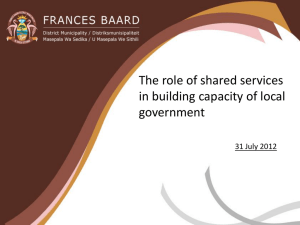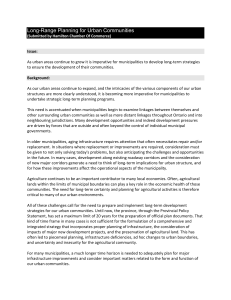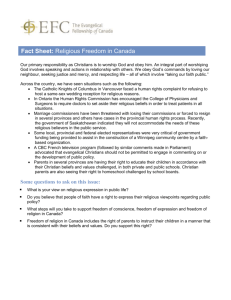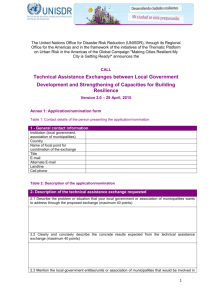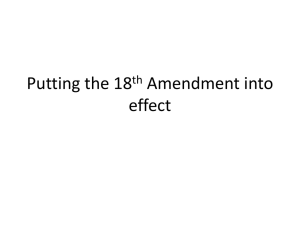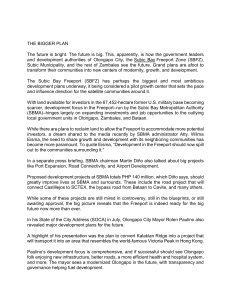2009-DA Lovemore-Q1024–air quality officers in each province
advertisement
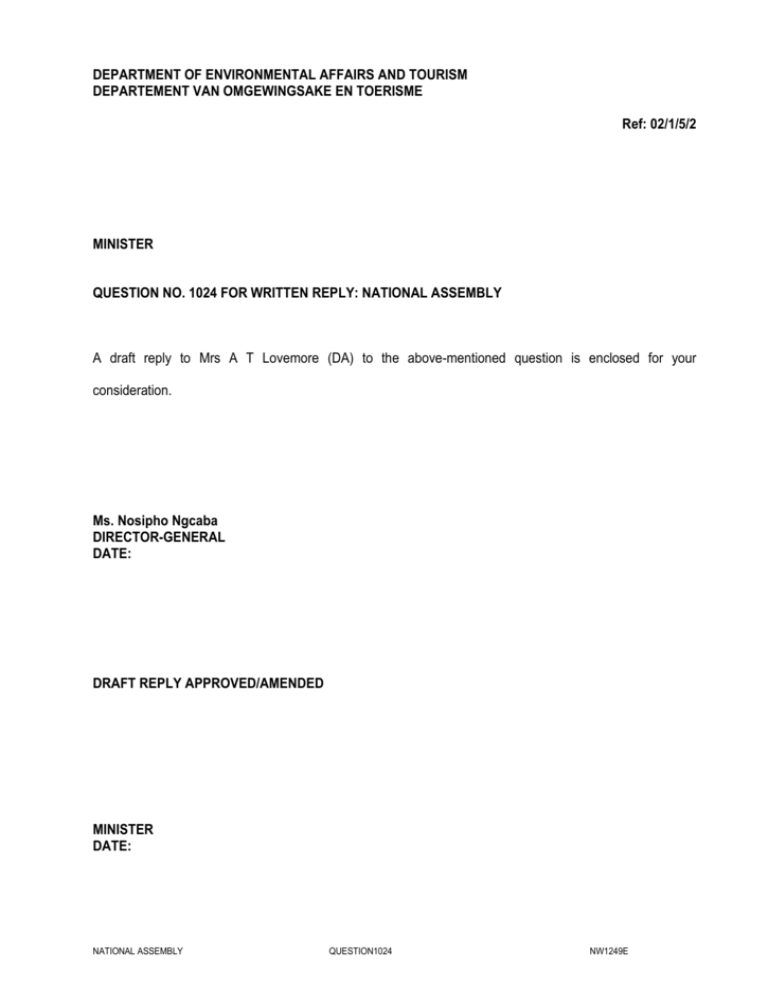
DEPARTMENT OF ENVIRONMENTAL AFFAIRS AND TOURISM DEPARTEMENT VAN OMGEWINGSAKE EN TOERISME Ref: 02/1/5/2 MINISTER QUESTION NO. 1024 FOR WRITTEN REPLY: NATIONAL ASSEMBLY A draft reply to Mrs A T Lovemore (DA) to the above-mentioned question is enclosed for your consideration. Ms. Nosipho Ngcaba DIRECTOR-GENERAL DATE: DRAFT REPLY APPROVED/AMENDED MINISTER DATE: NATIONAL ASSEMBLY QUESTION1024 NW1249E NATIONAL ASSEMBLY (For written reply) QUESTION NO. 1024 INTERNAL QUESTION PAPER NO 12 of 2009 DATE OF PUBLICATION: 28 August 2009 Mrs A T Lovemore (DA) to ask the Minister of Water and Environmental Affairs: (1) Whether all provinces and municipalities have appointed air quality officers in terms of the National Environmental Management: Air Quality Act, Act 39 of 2004; if not, (a) which (i) provinces and (ii) municipalities have not made the required appointments and (b) by which date must these appointments be made; (2) whether all provinces and municipalities have developed air quality management plans; if not, (a) which (i) provinces and (ii) municipalities have not developed such plans and (b) by what date should these plans be developed; (3) whether all national departments listed in Schedule 1 of the National Environmental Management Act, Act 107 of 1998, have developed air quality management plans; if not, (a) which national departments have not developed such plans and (b) by when must these plans have been developed; (4) whether her department is confident that the Air Quality Act can be implemented successfully; if not, what (a) obstacles to implementation have been identified and (b) plans are in place to overcome these obstacles? NW1249E MRS A T LOVEMORE (DA) SECRETARY TO PARLIAMENT HANSARD PAPERS OFFICE PRESS NATIONAL ASSEMBLY QUESTION1024 NW1249E 1024. THE MINISTER OF WATER AND ENVIRONMENTAL AFFAIRS ANSWERS: In response to the questions posed, it is important that the following responses are considered in the context of the 2007 National Framework for Air Quality Management in the Republic of South Africa (Government Gazette No. 30057 of 11 September 2007, Notice No. 830) which states in its Section 4.3 The implementation of the functions by the three spheres of government “…it is important that all provinces and municipalities that experience air quality issues within their jurisdictions [as per the list of identified ‘problem’ or ‘potential problem’ areas provided in Table 24 of the National Framework) build the necessary organisational capacity to implement [the air quality management] functions in an efficient and effective manner and in a manner that is commensurate with the air quality problems to be addressed… With a view to the effective and efficient use of government resources, the creation and maintenance of dedicated air quality management capacity in municipalities that are not listed in table 24 may not be necessary to ensure effective air quality management. As such, provincial departments are encouraged to liaise with such municipalities with a view to cooperative agreements in respect of air quality management functions.” In essence, in the interests of ensuring the effective and efficient use of government resources, the National Framework does not require municipalities that have no air quality problems to use limited resources to manage a “non-issue”. (1) To our knowledge, all provinces and municipalities listed in Table 24 of the National Framework have appointed air quality officers, or interim air quality officers, with the exception of the Free State which is in the process of appointing a new officer following the resignation of the previous officer; (2) There is no requirement within the Air Quality Act for ‘stand-alone’ provincial or municipal air quality management plans, i.e. each municipality must include an air quality management plan in its integrated development plan (IDP) (Municipal Systems Act: Chapter 5) and each province responsible for preparing an environmental implementation plan (EIP) or environmental management plan (EMP) must include in that plan an air quality management plan. Furthermore, the department only expects to see these plans as part of the prerequisite IDP, EIP or EMP for provinces and municipalities listed in Table 24 of the National Framework. This notwithstanding, the following table provides details on the status of air quality management planning – NATIONAL ASSEMBLY QUESTION1024 NW1249E Ref. 1. 2. 3. 4. 5. 6. 7. 8. 9. 1. 2. 3. 4. 5. 6. 7. 8. 9. 10. 11. 12. 13. 14. 15. 16. 17. 18. 19. 20. 21. 22. 23. 24. 25. 26. 27. 28. 29. 30. 31. 32. GOVERNMENT AIR QUALITY MANAGEMENT PLANS IN PLACE Department / Current Status Municipality Provincial Gauteng AQMP completed. Awaiting internal approval prior to gazetting Free State AQMP development process commenced in 2008, however, the project was kept on hold since the Director left the department. The post is not yet filled. No stakeholder meeting took place this year 2009 North West AQMP completed. Awaiting internal approval prior to gazetting Western Cape AQMP under development. Expected to be finalised in November 2009 Mpumalanga About 80% of the hot-spots areas are under the Highveld Priority Area Air Quality Management Plan which is currently underway Limpopo Currently planning to develop AQMP in-house. The actual process has not yet commenced KwaZulu-Natal KZN has finalised the data inventory project. AQMP process has not yet commenced Eastern Cape EC has the intention to develop the AQMP, however, financial constraints prohibit the process from going forward Northern Cape NC has indicated its intention based on air quality hot-spots areas such as Kimberly and Upington. No plans as yet Municipalities Johannesburg Completed and under implementation Ekurhuleni Completed and under implementation Cape Town Completed and under implementation Tshwane Completed and under implementation eThekwini Completed and under implementation Nelson Mandela Under development Sedibeng The Vaal Triangle Air-shed Priority Area Air Quality management Plan is the de facto plan Nkangala The Highveld Priority Area Air Quality management Plan will be the de facto plan Gert Sibande The Highveld Priority Area Air Quality management Plan will be the de facto plan Capricorn Completed and under implementation Ilembe District Completed and under implementation Municipality (Stanger) Drankenstein Under development Overburg Under development Eden Under development Cape Winelands Under development West Coast District The West Coast District Municipality (Western Cape) is in the planning phase of Municipality developing an Air Quality Management Plan and it is hoped that funds for this purpose will be available during the 2009/2010 financial year. Waterberg Under development Fezile Dabi Under development West Rand Under development Metsweding Under development Greater Sekhukhune Under development Keneth Kaunda In the planning phase of developing their Air Quality Management Plan and looking at availability of funds Bojanala Under development Rustenburg Complete and under implementation Pietermaritzburg Under development Mangaung Under development Motheo Under development Lejweleputswa Under development Umhlathuze Under development Msunduzi Msunduzi Municipality is currently in the process of developing a plan in partnership with consultants (ZES) and DEAT. Output of present project would be a baseline assessment report and gap analysis. Buffalo City Under development Lesedi Lesedi is will be covered by the Highveld Priority Area AQMP NATIONAL ASSEMBLY QUESTION1024 NW1249E (3) As above, there is no requirement within the Air Quality Act for ‘stand-alone’ departmental air quality management plans, i.e. each department responsible for preparing an environmental implementation plan (EIP) or environmental management plan (EMP) must include in that plan an air quality management plan. Thus the department only expects to see these plans as part of the prerequisite EIP or EMP for affected departments. This notwithstanding, the 2007 National Framework serves as the Department of Environmental Affair’s Air Quality Management Plan. (4) The Department is confident that the National Environmental Management: Air Quality Act (AQA) is, and will continue to be, successfully implemented. The scarcity of skilled human resources in the field of air quality management is a challenge. However, this is not a uniquely South African problem but a global phenomenon. In order to address this matter the Department has been undertaking capacity building workshops throughout all nine provinces over the past two years. Initially this capacity building was done using external consultants but the Department has over time developed in-house training skills. Currently all capacity building work undertaken by the Department is achieved using in-house trainers. Additional to the training was the development of a number of implementation manuals, guideline documents and standardized templates. Furthermore, tailor-made, accredited air quality governance training is also offered by the University of Johannesburg and the Cape Peninsular University of Technology. The Department continues to offer capacity building and training, with priority given to those municipalities specifically identified in Table 24 of the National Framework for Air Quality Management in South Africa. Following the full entry into effect of the AQA later this year / early next year, the officials within the national department, currently responsible for licensing, will become available as a resource to the new licensing authorities. These officials will provide ongoing technical support and guidance. Several intergovernmental structures have been developed over the past few years that will also assist in the transition. Provincial - Municipal Air Quality Officers Forums have been established in all nine provinces. These forums meet on a regular basis and these allow for the sharing of information, challenges and successes in the field of air quality management. The National - Provincial Air Quality Officers Forum allows for communication of important air quality matters from the national department to all the provinces, which in turn disseminate the information through their provincial forums. For the past four years the Department has hosted an annual Intergovernmental Air Quality Governance Lekgotla which brings together air quality managers from all three spheres of government for a two-day conference to discuss developments in the preparation for the full entry into effect of the AQA. The increasing attendance at this annual event indicates that there is steady growth in the numbers of officials involved in air quality management matters. NATIONAL ASSEMBLY QUESTION1024 NW1249E
